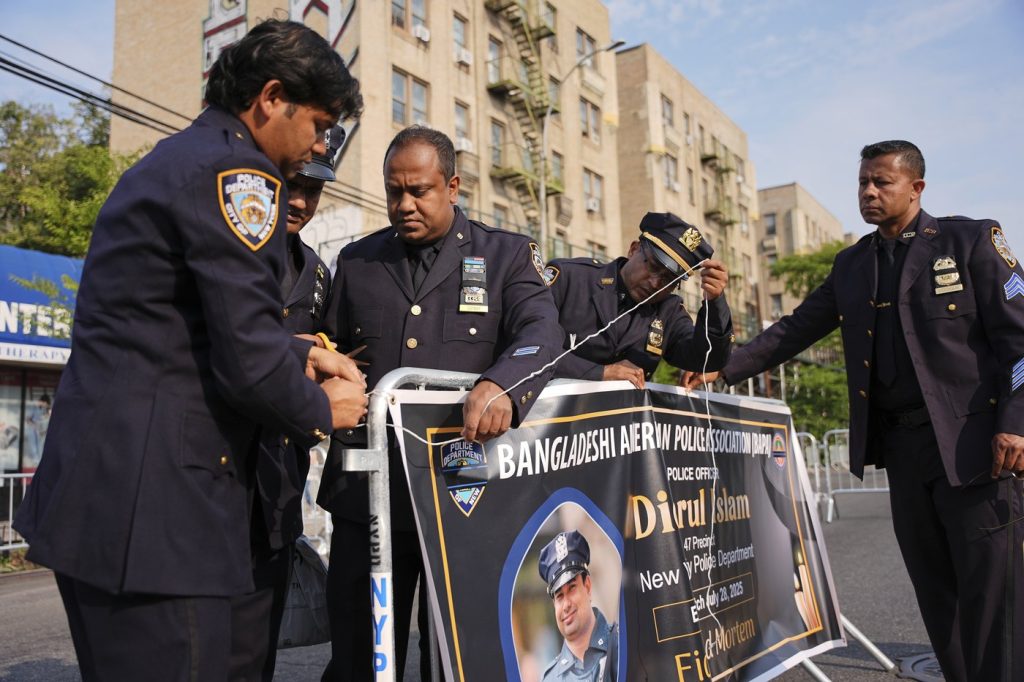NEW YORK (AP) — A poignant gathering took place outside the Bronx mosque where New York City Police Officer Didarul Islam was eulogized last week. A group of officers, donned in formal navy blue uniforms, solemnly displayed a banner featuring Islam's photograph and the name of the Bangladeshi American Police Association. Didarul Islam was one of four victims killed in the shooting at the Manhattan office tower housing the NFL's headquarters on July 28, making him the first Bangladeshi American officer in the NYPD to die in the line of duty.
His funeral highlighted the substantial recruitment success of the NYPD within the city’s vibrant Bangladeshi community. More than 1,000 of the NYPD’s approximately 33,000 uniformed officers are Bangladeshi Americans, along with another 1,500 individuals of Bangladeshi heritage among the department’s 19,000 civilian employees. These figures represent a significant increase from only a handful of officers a few decades prior. Many Bangladeshi officers attribute this growth partly to a patriotic response to the anti-Muslim sentiment that surged post-9/11, coupled with active recruitment efforts and word-of-mouth within the community.
Among the NYPD officers who stood in solidarity with the mourners on the streets, some honored traditions by wearing traditional South Asian attire, their police badges draped around their necks. Shamsul Haque, a co-founder of the NYPD's Bangladeshi officers’ group, reflected on Islam's impact, stating, “He actually uplifted our community in a way that was not imaginable before. His legacy will endure not only as a hero who gave his life protecting others, but also as a symbol of hope, integrity, and the American dream.”
The NYPD's outreach to the Bangladeshi community increased after the September 11 attacks when many Bangladeshi immigrants sought to combat stereotypes associating Muslims with terrorism. Haque, who joined the NYPD in 2004, noted that he was among the first few Bangladeshi immigrants in the force, and that many who followed him aimed to change perceptions of Muslims.
Throughout his career, Haque recognized the gradual shift in attitudes among his colleagues, stating, “Although we are immigrants, we are patriotic.” To continue the momentum, he and others began encouraging recent immigrants to start with civilian roles in the police department, such as traffic enforcement officers and school safety agents. Many individuals could then apply for the police academy after gaining U.S. citizenship, a pathway followed by approximately 60% of Bangladeshi heritage officers in the NYPD. Didarul Islam himself began his career as a school safety officer after immigrating to the U.S. about 16 years ago.
The marked increase of Bangladeshi representation in the NYPD has paved the way for further aspirations within the department, evolving their presence in a manner reminiscent of prior Irish, Italian, and Latino immigrant groups. Currently, among the uniformed officers of Bangladeshi descent, there are 10 detectives, 82 sergeants, 20 lieutenants, and four inspectors.
Officer Ishmam Chowdhury, who recently graduated from the police academy, reflected on the profound effect Islam's death had on him, particularly as he nears the arrival of his first child. “It just hit us a little different because like that made us think, what if it happens to me today? It can,” Chowdhury expressed, acknowledging the inherent dangers of their noble profession. After immigrating to the U.S. in 2019 and initially joining law enforcement in Washington, D.C., he returned to pursue a career with the NYPD, inspired by a desire to serve the community.
Chowdhury emphasized the incredible opportunity the U.S. provides, stating, “If somebody really works hard and truly wants to do something, they can do it.” The collective commitment of Bangladeshi American officers within the NYPD illustrates a testament to resilience, community, and dedication in public service.











